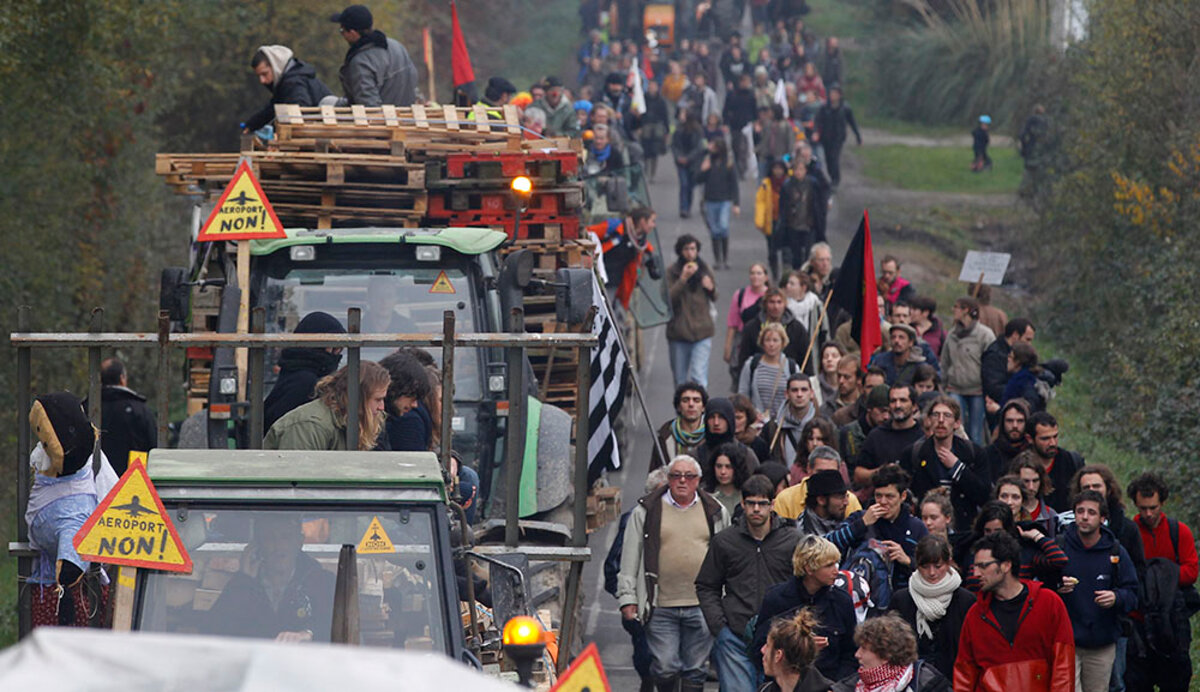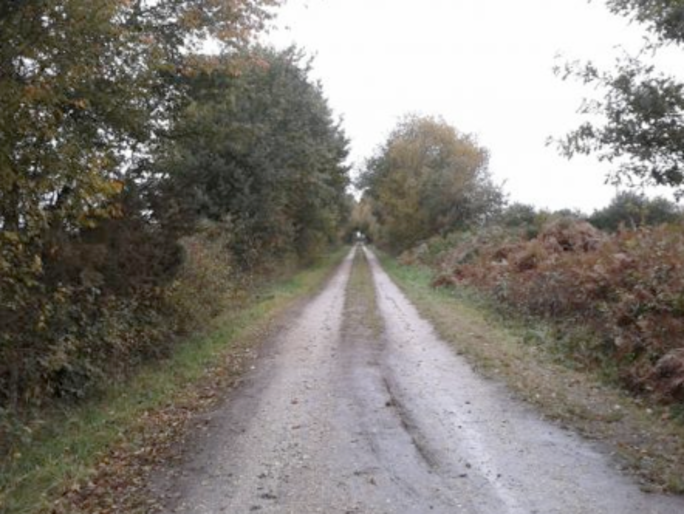A long-simmering protest movement against a project to build a new airport close to the town of Nantes, in western France, has over recent weeks grown into a major political battle that now threatens a rupture in the already strained relations between the ruling Socialist Party and its Green party allies, the EELV.
Thousands of demonstrators – 13,000 according to the police, 40,000 according to the protestors – turned out at the weekend, re-occupying the zone designated for the construction of Notre-Dame-des-Landes airport in a rural area close to Nantes, and which the largely socialist-led local authorities argue is a key element in the future development of the economy in north-west France.
The re-occupation followed a major police operation last month to evict protestors from their makeshift camps in the zone.

Enlargement : Illustration 1

The EELV party sent a delegation in support of the protest on Saturday, highlighting its several recent differences with the socialist government in which it has two ministers. Exacerbating the conflict is the longstanding support leant to the project, also known as the ‘Great West’ airport, by French Prime Minister Jean-Marc Ayrault who, until his appointment as PM in June, was mayor of Nantes and head of its greater urban council.
Notre-Dame-des-Landes will replace the existing low-capacity Nantes-Atlantique airport, with increased freight facilities and a yearly passenger capacity of nine million – six million more than at present.
“We are in a society in which movements are ever more numerous and rapid,” commented Philippe Grosvalet, the socialist president of the regional council of the Loire-Atlantique department (county). “An area that is not connected by road and air [is one from which] companies leave.”

Ayrault has said the airport project enjoys a “very large” local consensus. To prove the point, 36 socialist Members of Parliament from the different regions surrounding Nantes, and which are due to be served by the new airport, reiterated their support for it in a joint statement.
For some three years, activists from anti-capitalist and environmental groups have set up camps inside the rural area designated for the new airport. Despite an initially cool reception, they have received increasing support from local farmers who will be expropriated to make way for the construction work due to begin in 2014.
"I am not a revolutionary, but it’s shameful to knockdown all these houses," commented Denise (last name withheld), a farmer’s wife who joinded the re-occupation march on Saturday.
Management of the airport, estimated to cost more than 550 million euros and due to open on January 1st 2017, will be handed to construction group Vinci for a 55-year concession period.
“It is the most dynamic region in France,” said Nicolas Notebaer, head of Vinci’s airport management subsidiary, Vinci Airports, in an interview with Mediapart last year. “The [regions of] Pays de Loire and Brittany are the places where there is the strongest and most durable growth of the population and the economy. Those very dynamic towns which have managers and universities cannot prosper simply within a relationship with Paris.”
Police evictions strengthened support for the protest
Along with Vinci, a number of local interests are involved in the project, including the Nantes Chamber of Industry and Commerce, a bank, a multinational group specialized in public transport, and a taxi company. Dominique Luneau, who runs a local press agency specialized in economic affairs, wrote earlier this month on his blog that the airport’s opponents “ignore that the quality of transport infrastructures is one of France’s principle cards for attracting economic activities and investment that creates jobs”.
The legal steps required for establishing and launching the airport project have all been met. After public debates organised between 2002 and 2003, there then followed a public enquiry, between 2006 and 2008, after which the building of the airport was officially declared to be of public interest. The decree by which Vinci was granted the concession to run the airport was announced in 2010.
What’s more, in local elections over this same period, candidates of the Socialist Party and the Communist Party were consistently elected on a manifesto of support for the new airport.

Yet, despite the project’s ratification through both the legal process and at the ballot box, the movement of resistance against it has continued to grow to what now appears a possible turning point.
For since the intervention of police last month to forcefully evict the protestors from their camps inside the 1,700 hectares earmarked as the future construction zone, this small oasis of countryside within the peri-urban area surrounding Nantes has become the focus of more than only media attention.
From Greenpeace, the League of Human Rights, and radical farmers’ associations, to anti-globalisation groups and organizations that defend the homeless, and now joined by the EELV party, a broad alliance has been formed to defend those opposing the airport, who just months ago were a small and lonely community.
The TV footage of the evictions, carried out manu militari and involving mechanical diggers that were brought in to shake down tree houses built by the protestors, portrayed the heavy-handed aggression of the state targeting largely peaceful activists.
The image of this non-violent three-year occupation of the future construction zone was only recently marred by the physical attack against a security guard on the night of November 12th, as yet non-elucidated and condemned by all the associations taking part in the protest.
“If the conflict is more violent today, it is entirely down to the police,” said Geneviève Lebouteux, a regional councillor for the EELV partyy, in an interview earlier this month with French TV news channel France 24. “By evicting people to silence the dissent, all the government has succeeded in doing is to help the movement gain momentum.”
-------------------------
English version: Graham Tearse


